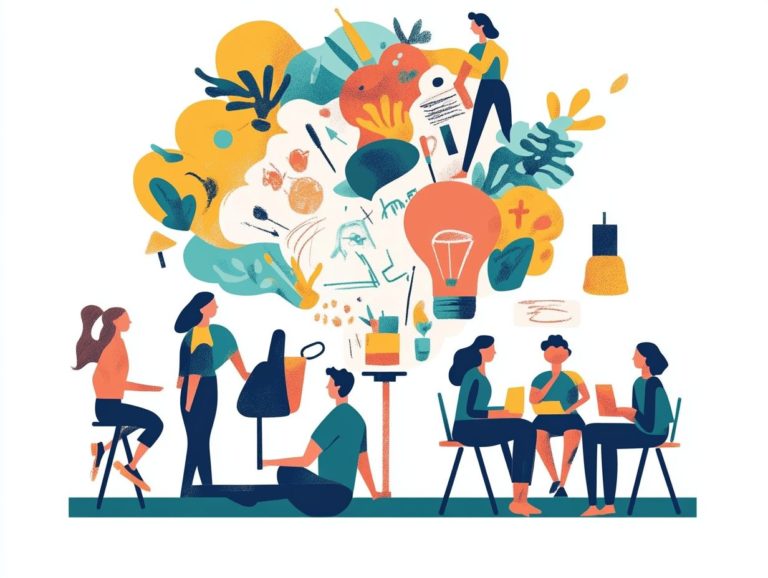Understanding the Link Between Social Media and Procrastination
Ever found yourself scrolling instead of studying? Procrastination is a common issue, often intensified by the captivating pull of social media. As you scroll through endless feeds, it s all too easy for important tasks to fall by the wayside.
This exploration delves into the intricate relationship between social media usage and procrastination, examining the psychological and neurological factors that keep you distracted. It also offers practical strategies to help you break free from this cycle, emphasizing the benefits of reducing social media consumption for both your productivity and mental well-being. Start today to take back your focus and time!
Contents
- Key Takeaways:
- The Role of Social Media in Procrastination
- The Science Behind Procrastination and Social Media
- Strategies for Overcoming Procrastination Caused by Social Media
- The Benefits of Reducing Social Media Use
- Frequently Asked Questions
- Why do people procrastinate on social media?
- How does social media use affect productivity?
- Can social media use lead to procrastination?
- How can I break the cycle of social media procrastination?
- Are there any benefits to using social media?
Key Takeaways:
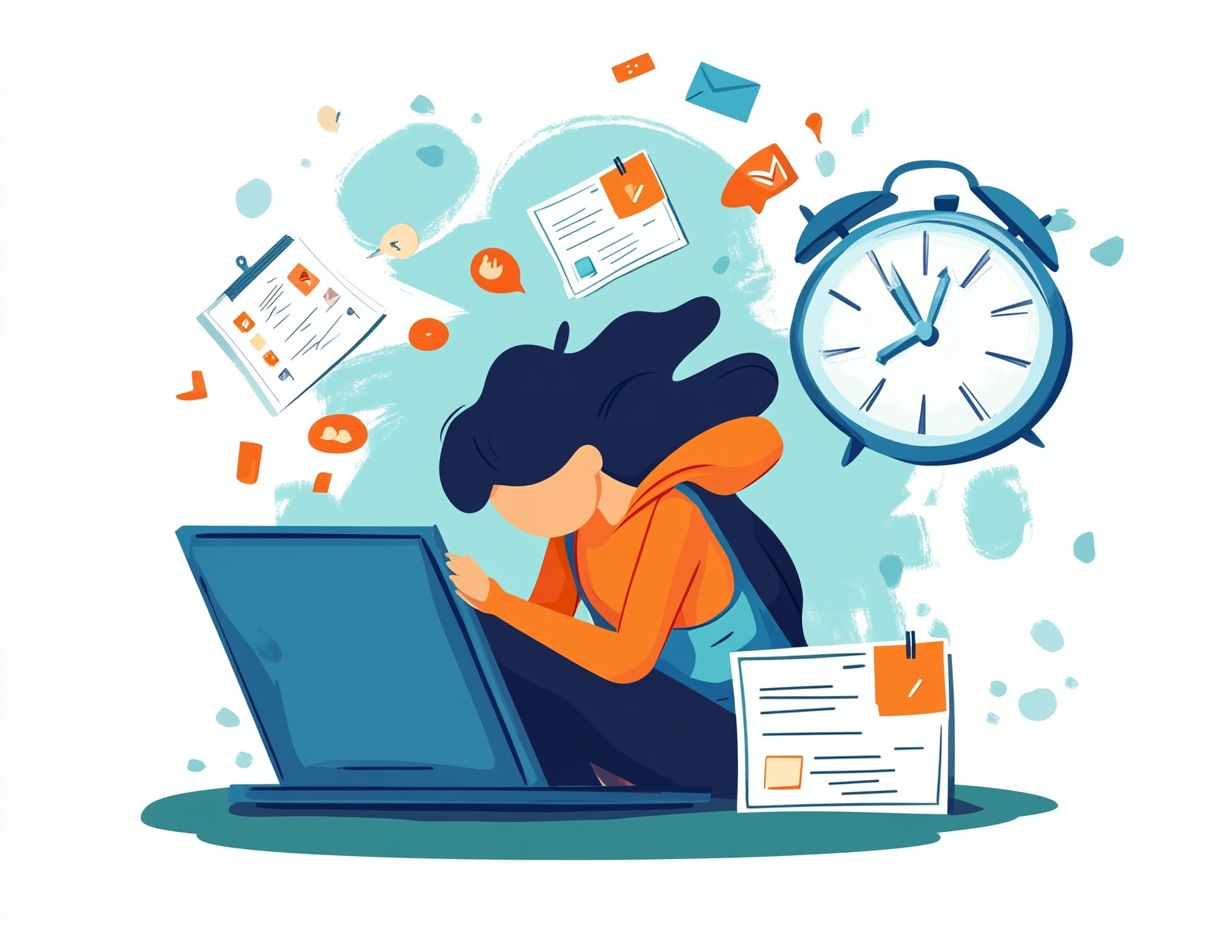
- Social media offers endless distractions that can trick you into thinking you re productive.
- Procrastination caused by social media is influenced by psychological and neurological factors, making it a complex behavior to overcome.
- Implementing effective time management techniques can help you break the cycle of distraction and improve productivity and mental well-being.
Defining Procrastination and Its Impact
Procrastination is a common issue that affects students in various academic environments, often resulting in declines in both academic performance and overall productivity. Defined as the act of delaying or postponing tasks, it can arise from multiple factors, including boredom, impulsivity, and a lack of self-regulation.
Recent trends reveal the widespread nature of procrastination among students in the US, UK, and Saudi Arabia, and its impact on mental health is significant. As deadlines approach, you might find yourself ensnared in a cycle of self-doubt and anxiety, which can intensify feelings of inadequacy and stress.
The forms of procrastination vary widely, ranging from casual, short-term delays to chronic avoidance behaviors that obstruct your long-term goals. These patterns undermine your academic success and take a toll on your emotional well-being, as you contend with guilt and shame for not achieving your potential.
Grasping these underlying mechanisms is essential for addressing the implications of procrastination on mental health and for cultivating healthier academic habits.
The Role of Social Media in Procrastination
Social media has emerged as a pivotal element in the procrastination challenges students face, serving as a double-edged sword that can bolster productivity or plunge them into distractions. With platforms like Facebook, Twitter, and Instagram vying for your attention, it can be quite difficult to stay focused on your academic responsibilities.
The rising prevalence of social networking sites correlates with various forms of procrastination, revealing cultural nuances that influence how students from different backgrounds navigate their time management.
How Social Media Can Contribute to Procrastination
Social media can significantly fuel procrastination trends among students, creating distractions that undermine effective self-regulation. The constant barrage of notifications and the tempting allure of scrolling through feeds can easily divert your attention from academic responsibilities, fostering a cycle of procrastination that feels almost impossible to escape.
This reliance on social networking platforms is linked to decreased self-control, making it essential to adopt strategies to counteract these distractions. These platforms often trigger impulsive behaviors; you might find yourself mindlessly clicking through posts, captivated by curated content that seems relevant yet distracts you from your responsibilities.
The dopamine rush from likes and shares offers a fleeting sense of gratification but can undermine your long-term goals. Psychological factors, such as fear of missing out (FOMO) and social comparison, only add to the dilemma, pulling you further away from your intended tasks.
By understanding these dynamics through the lens of cognitive behavioral therapy, you can empower yourself to develop healthier habits and improve your self-regulation, allowing you to reclaim your focus and productivity.
Take action today to implement these strategies and break free from the cycle of procrastination!
The Science Behind Procrastination and Social Media
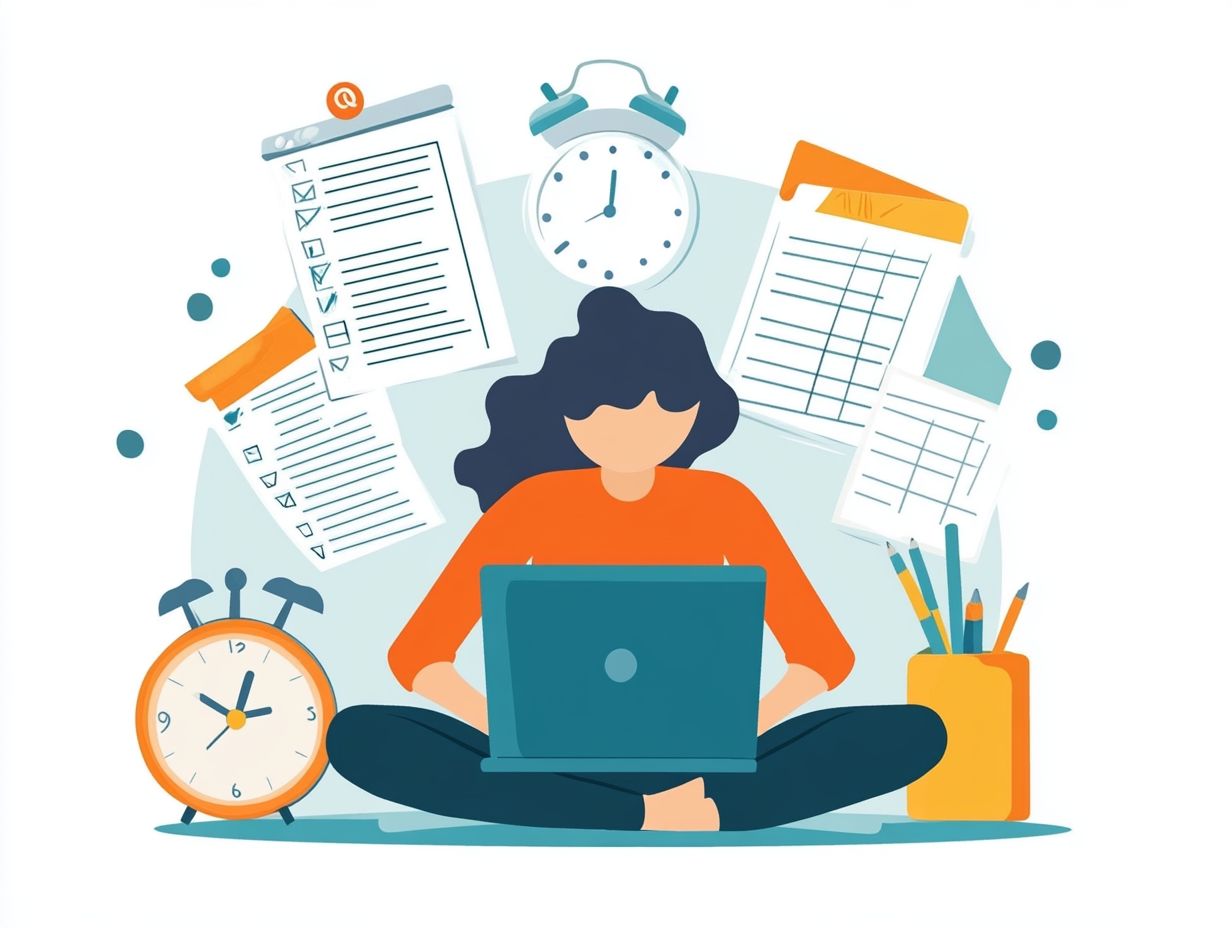
Understanding procrastination and its link to social media requires a deep dive into the psychological and neurological factors that influence your behavior. Research indicates that your brain s reward system lights up with instant gratification, like scrolling through social media. This can trigger emotional responses that easily overshadow your academic obligations.
This complex interplay can be addressed through cognitive behavioral therapy, a type of therapy that helps change negative thinking patterns, ultimately reducing procrastination.
Psychological and Neurological Factors
Several psychological and neurological factors significantly influence your tendency to procrastinate, especially if you’re a student. Impulsivity and a lack of self-control often overshadow your academic responsibilities.
The brain’s reward systems create a strong preference for immediate gratification, making it less appealing for you to tackle tasks that require sustained effort.
By understanding these factors, you can develop effective countermeasures against procrastination. For example, cognitive behavioral therapy can help you regain control over your study habits.
Exploring theories like Temporal Motivation Theory, which explains how we prioritize tasks based on urgency and reward, can provide valuable insights into your procrastination tendencies.
Addressing your impulsivity through mindfulness practices can cultivate greater self-discipline, helping you break free from procrastination. Implementing structured schedules and setting achievable goals can maintain your focus and motivation, guiding you toward more productive behaviors.
Acknowledging these psychological underpinnings empowers you, equipping you with the necessary tools to navigate your academic responsibilities more effectively.
Strategies for Overcoming Procrastination Caused by Social Media
Take charge! Use these strategies to crush procrastination fueled by social media. It’s essential now to boost your productivity, especially in a world filled with constant online distractions.
These strategies can range from refining your time management techniques to employing cognitive behavioral therapy, focusing on reshaping your thought patterns related to your study habits and social media usage.
Effective Time Management Techniques
Effective time management techniques are vital for you as a student striving to combat procrastination and elevate your academic productivity. By employing strategies like the Pomodoro Technique, which involves studying in short bursts with breaks in between, prioritizing tasks, and setting specific goals, you can create a structured study environment that minimizes social media distractions.
Consider breaking down larger assignments into smaller, manageable tasks. This can alleviate feelings of overwhelm and make it easier to get started. Using digital planners or apps can help you stay organized by setting reminders for deadlines and study sessions to foster accountability.
Regularly reviewing and adjusting your schedule ensures you remain on track and can easily adapt to unexpected obligations. By incorporating these actionable strategies, you ll become more productive and better equipped to handle your coursework with efficiency and confidence.
Breaking the Cycle of Social Media Distraction
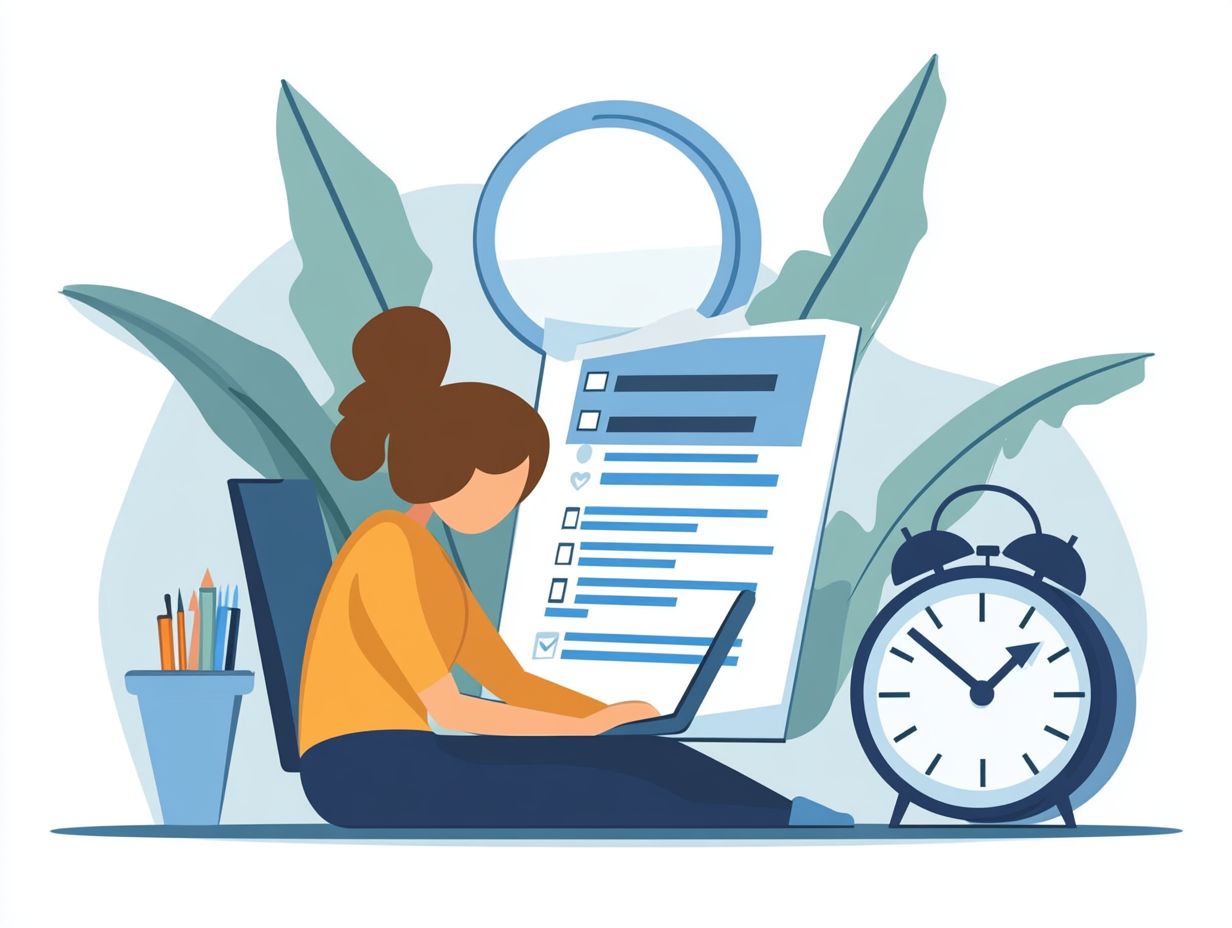
Breaking the cycle of social media distraction is essential for you if you’re grappling with procrastination. It enables a renewed focus on your academic responsibilities.
By adopting a structured approach to your study habits, you can create boundaries that enhance your concentration. For example, setting specific time slots for social media use can significantly reduce interruptions during vital study sessions.
Leveraging various productivity apps designed for time management will allow you to track your online activities, keeping you accountable for how you spend your time. Establishing a clutter-free and designated study area can also help you focus.
Together, these strategies act as powerful defenses against the distractions of digital platforms, giving you the power to reclaim control over your academic journey.
The Benefits of Reducing Social Media Use
Reducing your social media use offers a wealth of benefits that can greatly enhance both your productivity and mental well-being, especially if you find yourself struggling with procrastination.
By limiting your time on social networking sites, you can refocus your attention on your academic responsibilities. This shift not only improves your grades but also has a positive effect on your mental health, paving the way for a more balanced and fulfilling lifestyle.
Improved Productivity and Mental Well-being
The enhancement of your productivity and mental well-being often stems from cutting back on social media use. By dedicating more time to your academic tasks and less to online distractions, you will feel a surge of focus, which ultimately leads to improved academic performance and reduced stress levels.
This shift enables you to engage more deeply with your studies, creating a rewarding sense of accomplishment that can serve as a powerful motivator. As you channel your energy away from digital platforms, you might find yourself completing assignments with greater efficiency, resulting in better grades and a clearer grasp of the material.
By minimizing the constant barrage of notifications and updates, you can cultivate a tranquil mental environment that fosters critical thinking and creativity. Less dependence on social media not only beats procrastination but also nurtures a healthier mindset, giving you the power to flourish both academically and personally.
Taking Control of Procrastination and Social Media Use
Take charge of procrastination and social media to boost your academic success! It requires a conscious effort to establish self-control methods. By setting clear boundaries around your social media usage and practicing mindfulness, you can take charge of your study habits, significantly reducing those pesky procrastination tendencies.
Along with these foundational strategies, creating a structured daily schedule can greatly enhance your productivity. Using a method like the Pomodoro Technique, which involves studying for 25 minutes followed by a short break, can help you stay fresh and focused.
Engaging in goal-setting practices and setting short, achievable objectives makes it easier to maintain your momentum. Don t underestimate the power of turning off notifications during study hours; it minimizes distractions and creates a more concentrated, effective learning environment.
Frequently Asked Questions
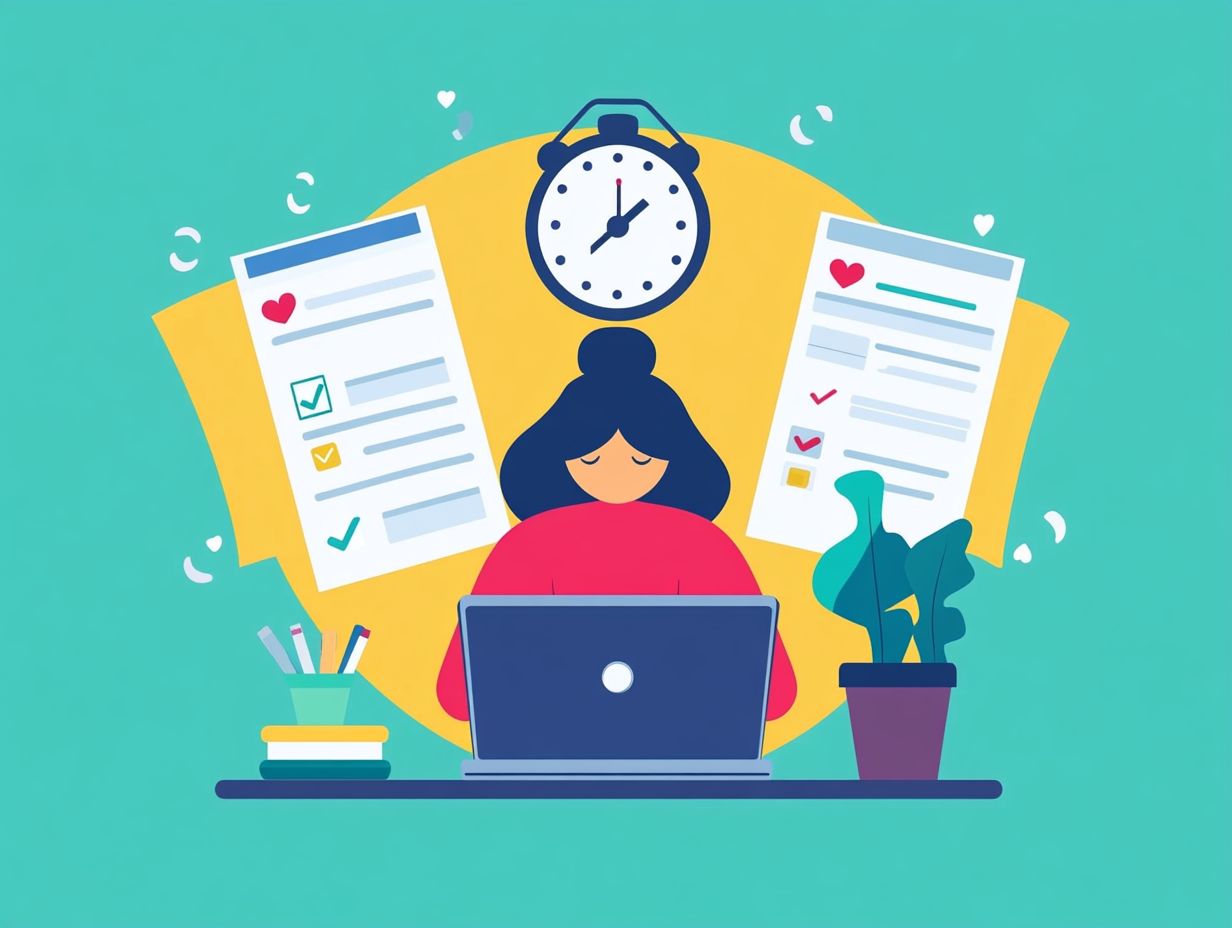
The link between social media and procrastination refers to the tendency for individuals to delay or put off important tasks and instead spend time on social media platforms.
People often procrastinate on social media because it’s highly engaging. The fear of missing out and the need for instant gratification can pull us in.
Spending too much time on social media can hurt productivity. It takes away time that could be used for important tasks.
Yes, social media can easily distract us. This distraction often causes us to delay or avoid necessary tasks.
To break the habit of procrastinating on social media, set specific time limits for its use. Identify triggers that cause you to procrastinate and find alternative activities.
While spending too much time on social media can lead to procrastination, it also has benefits. It helps people stay connected, network, and access valuable information. Finding a balance is key to being productive.






